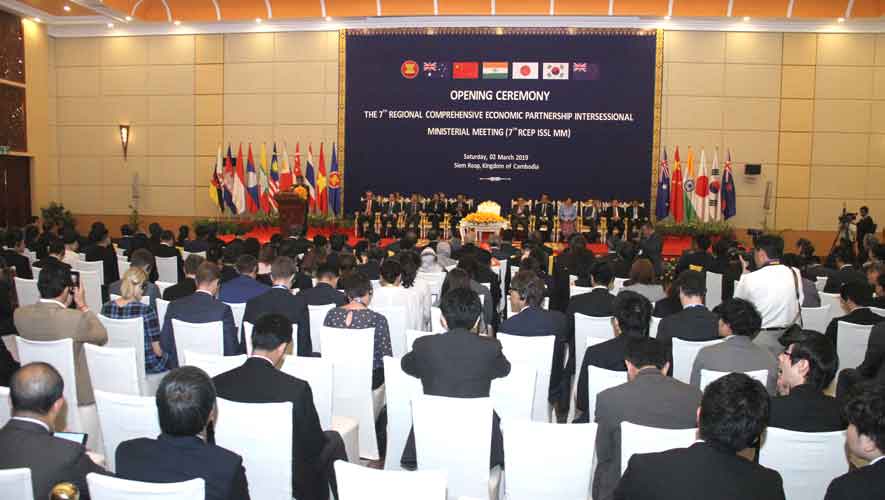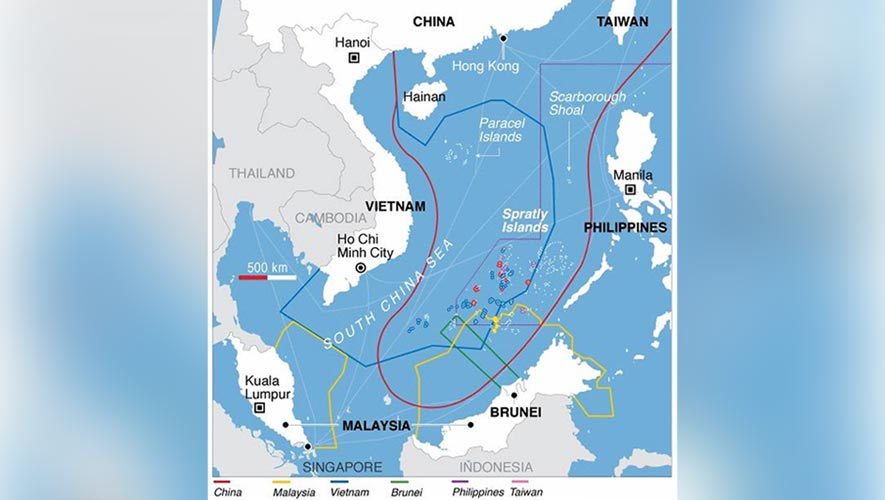Cambodia bides its time for a new revenue stream from RCEP amid long-standing negotiations
For the latest Cambodian Business news, visit Khmer Times Business
As the months roll closer to the conclusion of the Regional Comprehensive Economic Partnership (RCEP) this year, Cambodia might just be able to visualise better trade opportunities to overcome the revenue impact from the withdrawal of the Everything but Arms (EBA) preference.
For the Kingdom, the much-awaited trade agreement is considered kosher as it steers clear from the alleged danger of protectionism by certain countries, superpowers included, that push self-interest agendas.
“The current global multilateral trade, which is free and open, is under threat by some nations and superpowers to implement single or bilateral principles based on self-interest. This is (a form of) protectionism that could impact free trade movement in the region,” Prime Minister Hun Sen cautions during the seventh RCEP Intersessional Ministerial Meeting in Siem Reap last weekend.
To ensure RCEP’s full benefit, Cambodia is willing to amend laws and regulations to comply with the wordings in the agreement but negotiations must first reach a conclusion with transparency.
“All parties shall regard the negotiation as a win-win process, meaning that there would be fair contribution to every party regardless of existing development gaps,” Hun Sen says.
Although not overt, his comments point to Cambodia’s non-relationship with the US. The nation’s attitude towards the Western superpower was obvious when it stayed out of the US-led Trans Pacific Partnership, and later decided to continue its abstention with the Comprehensive and Progressive Agreement for Trans Pacific Partnership (CPTPP). This, despite America’s absence following President Donald Trump’s slaying of the TPP.
In the meantime, RCEP participating countries are expected to respect political will and offer direction to the trade negotiation committee particularly on the provision of special treatment and market access to least developed countries, Hun Sen says.
“I hope when the negotiation of RCEP concludes, the countries would gain a lot of benefit from this multilateral trade. All parties shall look into the common aspect of huge potentials and benefits of the agreement so that this negotiation process overcomes all impeding challenges ahead,” he adds.
According to 2014 data, RCEP represents 30 percent of the global gross domestic product. It makes up 28.5 percent of global trade, and one fifth of foreign direct investment flow in 2016.

Terms of the agreement between the 10 Asean member states and six Asean-free trade partners Australia, China, India, Japan, South Korea, and New Zealand, have been negotiated since 2012 with nearly every year being the deadline for conclusion.
Asian Development Bank lead economist Jayant Menon opines that RCEP is reeling from failing to reach the intended substantial conclusion last year.
Due to greater global uncertainty on trade, and the CPTPP progressing forward, the pressure to meet the RCEP deadline is imminent.
Jayant tells Capital Cambodia that issues which are to be resolved relate to agricultural protection, labour movement and rules to e-commerce with India being majorly concerned about agriculture issues.
“However, I do think that they (parties) are finally reaching a point where all countries can come onboard to finalise the deal,” he adds.
Mey Kalyan, senior adviser to the Supreme National Economic Council says RCEP is good for Cambodia because it will boost trade if everything goes smoothly.
“In fact, any trade agreement is good for Cambodia. EBA is another thing though,” he adds in an interview with Capital Cambodia.
Kalyan says RCEP could target different segments of trade in the country besides rice and garment. It might not be a replacement to rice and garment but the trade agreement encourages new industries to relocate to Cambodia. Having said that, although the country has free trade, and it is open, it does not have many products to export.
“Here is where China comes in. Goods can be produced here and exported to other parts in Asia. (What I am saying is)… opening up our market further will not replace the US and European Union markets but RCEP could potentially expose us to new markets,” Kalyan says.
Similarly, Jayant feels that RCEP can help diversify its import and export markets, adding that, “if the Kingdom loses the EBA access to EU, it will need to look towards this region more closely to replace lost export sales to Europe. Although the preferences of RCEP will not be as attractive as EBA, it can still provide a cushion during the adjustment period”.
Meanwhile, Commerce Minister Pan Sorasak feels that the parties have discussed and some member states would conduct bilateral and multilateral talks to finalise the agreement.
“About 90 percent of the issues has been resolved. The remaining 10 percent is tough as it requires government willpower. So it is no more a technical discussion on the agreement, rather a political will from the respective governments,” he says.
Negotiations by the parties are expected to be completed in November with an agreement by the end of the year, making the deal larger than the now-defunct TPP.
“As the host country for the negotiations, we are playing a crucial role in bringing the discussions to an end this year,” Sorasak says excitedly. He adds: “With this agreement, we will attract more factories to process raw material like agriculture products, ensuring trade balance. This in time would put us on par with other nations without the need of grant and preferences”.
Sok Chan
Business Writer, Capital Cambodia




